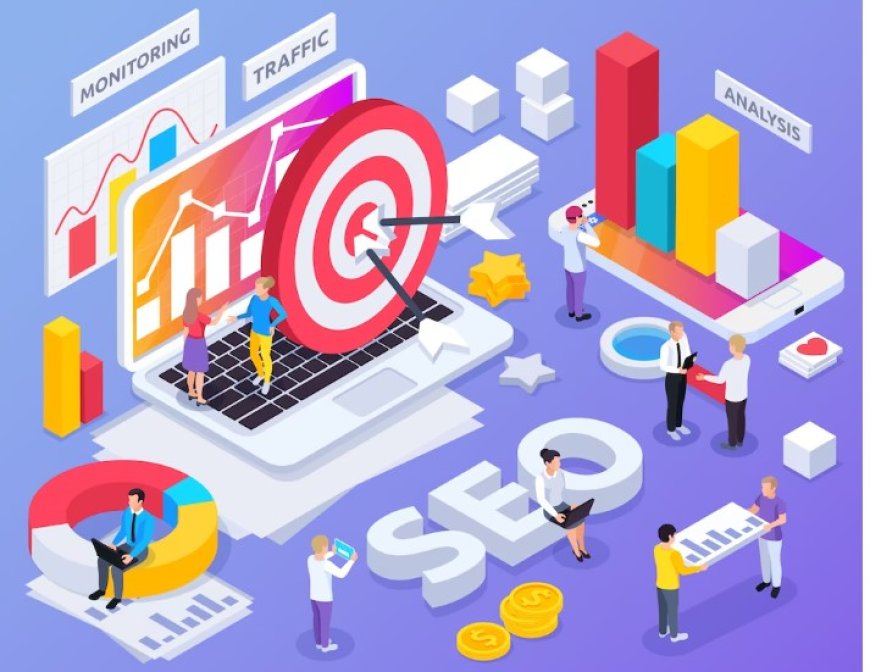Understanding the Importance of SEO in Digital Marketing
Discover the crucial role of SEO in digital marketing. Learn how optimizing your website can boost online visibility, drive organic traffic, and enhance your online presence.

In the digital era, establishing a robust online presence is no longer optional; it's imperative for businesses to thrive. At the heart of this online success is the indispensable practice of Search Engine Optimization (SEO). SEO is both an art and a science, aimed at optimizing a website's ranking in search engine results, driving organic traffic, and captivating potential customers. Delving deeper into the importance of SEO in digital marketing reveals a world of opportunities for growth, brand credibility, and competitiveness in today's digital landscape.
What is SEO?
SEO, or Search Engine Optimization, is the systematic process of enhancing a website's visibility and ranking in Search Engine Results Pages (SERPs). This multifaceted practice employs various techniques like keyword optimization, content refinement, and link building to attract organic traffic and elevate a website's online presence. The ultimate goal of SEO is to make websites more appealing to search engines, resulting in higher rankings and increased visibility to potential users and customers.
The Significance of SEO in Digital Marketing
SEO is a cornerstone of the digital marketing landscape, and its importance can't be overstated. Firstly, it significantly improves a website's visibility and search engine rankings, leading to increased organic traffic and potential customers. By optimizing both content and technical aspects, SEO enhances user experience and engagement, both of which are critical for online success. Moreover, SEO is a cost-effective strategy compared to paid advertising, making it an attractive option for businesses of all sizes. By investing in SEO, companies can establish long-term sustainability and build a strong brand reputation, ultimately gaining a competitive edge in the ever-evolving digital marketplace.
The Fundamentals of SEO
SEO involves a comprehensive approach that encompasses several key components:
-
On-page optimization: This focuses on enhancing elements like title tags, meta descriptions, headings, and content to make web pages more search engine-friendly.
-
Off-page optimization: This entails building high-quality backlinks and cultivating a positive online reputation through social media and other platforms.
-
Technical SEO: This deals with the technical aspects of a website, ensuring it is easily accessible and understandable by search engines, including factors like site speed, mobile-friendliness, and proper URL structures.
Implementing these fundamental SEO strategies effectively enables websites to attract more organic traffic, improve user experience, and enhance their overall digital marketing performance.
Advantages of SEO in Digital Marketing:
SEO offers a multitude of advantages within the digital marketing realm:
-
Increased Organic Website Traffic: By optimizing your website for relevant keywords and providing valuable content, SEO helps attract more targeted and organic traffic from search engines.
-
Better User Experience and Engagement: SEO practices, such as improving site navigation and loading speed, enhance the user experience, leading to increased engagement and lower bounce rates.
-
Higher Brand Visibility and Credibility: Ranking higher in search results boosts brand visibility and establishes trust and credibility among users, as they often perceive top-ranking websites as more reliable.
-
Cost-Effectiveness Compared to Paid Advertising: SEO is a cost-effective digital marketing strategy, as it doesn't require direct payment for clicks or impressions like paid advertising methods.
-
Long-Term Sustainability: Unlike some short-term marketing tactics, SEO efforts can have lasting impacts, providing consistent traffic and results over time with ongoing optimization.
SEO and Content Marketing
SEO and content marketing are intertwined elements of a successful digital marketing strategy. Content marketing aims to create valuable, informative, and engaging content for the target audience, while SEO ensures that this content is easily discoverable by search engines. High-quality content plays a crucial role in SEO success, as search engines favor relevant and authoritative content. To optimize content for search engines, businesses must conduct keyword research, use relevant keywords naturally, and focus on user intent. By combining SEO and content marketing, businesses can improve their online visibility, attract more organic traffic, and build a loyal customer base.
SEO Keyword Research
SEO keyword research is a pivotal aspect of search engine optimization. By comprehending the significance of relevant keywords, businesses can enhance their online visibility and attract targeted traffic. Utilizing various tools and techniques, such as Google Keyword Planner and competitor analysis, helps identify high-impact keywords. Implementing these keywords strategically in content and metadata allows websites to rank higher in search results, improving overall SEO performance and driving valuable organic traffic.
On-Page SEO Best Practices
On-page SEO involves implementing key strategies directly on your web pages to improve search engine visibility and user experience. Start by optimizing title tags, meta descriptions, and headings with relevant keywords to enhance click-through rates and search ranking. Utilize user-friendly URLs that convey the page's content concisely. Optimize images with descriptive alt text and proper file names to make them search engine-friendly. Lastly, focus on creating valuable and shareable content that engages users and encourages them to stay on your website longer. These practices contribute to higher rankings, increased organic traffic, and better overall performance in search results.
Off-Page SEO Strategies
Off-page SEO refers to activities done outside of your website to improve its search engine rankings. It involves building a strong online presence and reputation through various tactics. Key components include understanding the significance of backlinks and their impact on search rankings. Building high-quality backlinks from reputable websites can enhance your website's authority and visibility in search results. Additionally, leveraging social media platforms effectively can further boost your off-page SEO efforts, as social signals play a role in search engine algorithms. Combining these strategies helps establish a strong online reputation and drive organic traffic to your website.
Technical SEO Considerations
Technical SEO considerations are crucial for optimizing a website's performance and search engine rankings. Firstly, website speed directly impacts SEO; faster loading times improve user experience, and search engines favor faster sites. Secondly, mobile-friendliness and responsive design are essential as mobile traffic continues to grow, and Google prioritizes mobile-friendly websites in search results. Lastly, having a proper website structure and navigation ensures search engines can crawl and index your site efficiently, enhancing its visibility and accessibility to users. Addressing these technical aspects enhances SEO, leading to improved organic traffic and better overall user satisfaction.
Monitoring and Measuring SEO Success
Monitoring and measuring SEO success is vital for assessing the effectiveness of your digital marketing efforts. Google Analytics provides valuable insights into website traffic and user behavior, helping you understand which strategies drive the most engagement. Monitoring keyword rankings and organic search performance gives you a clear picture of your SEO performance. Analyzing SEO reports and data empowers you to make informed decisions, enabling continuous improvement and ensuring your SEO strategies align with your business goals. By leveraging these tools, you can optimize your online presence and stay ahead in the competitive digital landscape.
SEO Trends and Future Prospects
The SEO landscape is continually evolving, demanding marketers to stay ahead of emerging trends. Voice search and AI-driven SEO are gaining momentum as users interact with technology differently. Optimizing for voice queries and leveraging AI tools becomes crucial to stay competitive. Additionally, continuous learning and adaptation are essential to navigate the dynamic SEO environment successfully. Staying updated with search engine algorithms and user behavior empowers businesses to craft effective strategies that ensure visibility and growth in the ever-changing digital world.
SEO stands as a critical component of successful digital marketing strategies. By optimizing websites to rank higher in search engine results,businesses can attract more organic traffic, enhance user experience, and build brand credibility. Embracing SEO best practices and staying updated on evolving trends will empower companies to thrive in the dynamic digital landscape. Investing in SEO is a long-term commitment that can yield significant benefits, ensuring a competitive edge and sustainable growth in the online world. As the digital realm continues to evolve, the value of SEO in digital marketing remains unwavering, providing a pathway to digital success for businesses of all sizes and industries.




























































